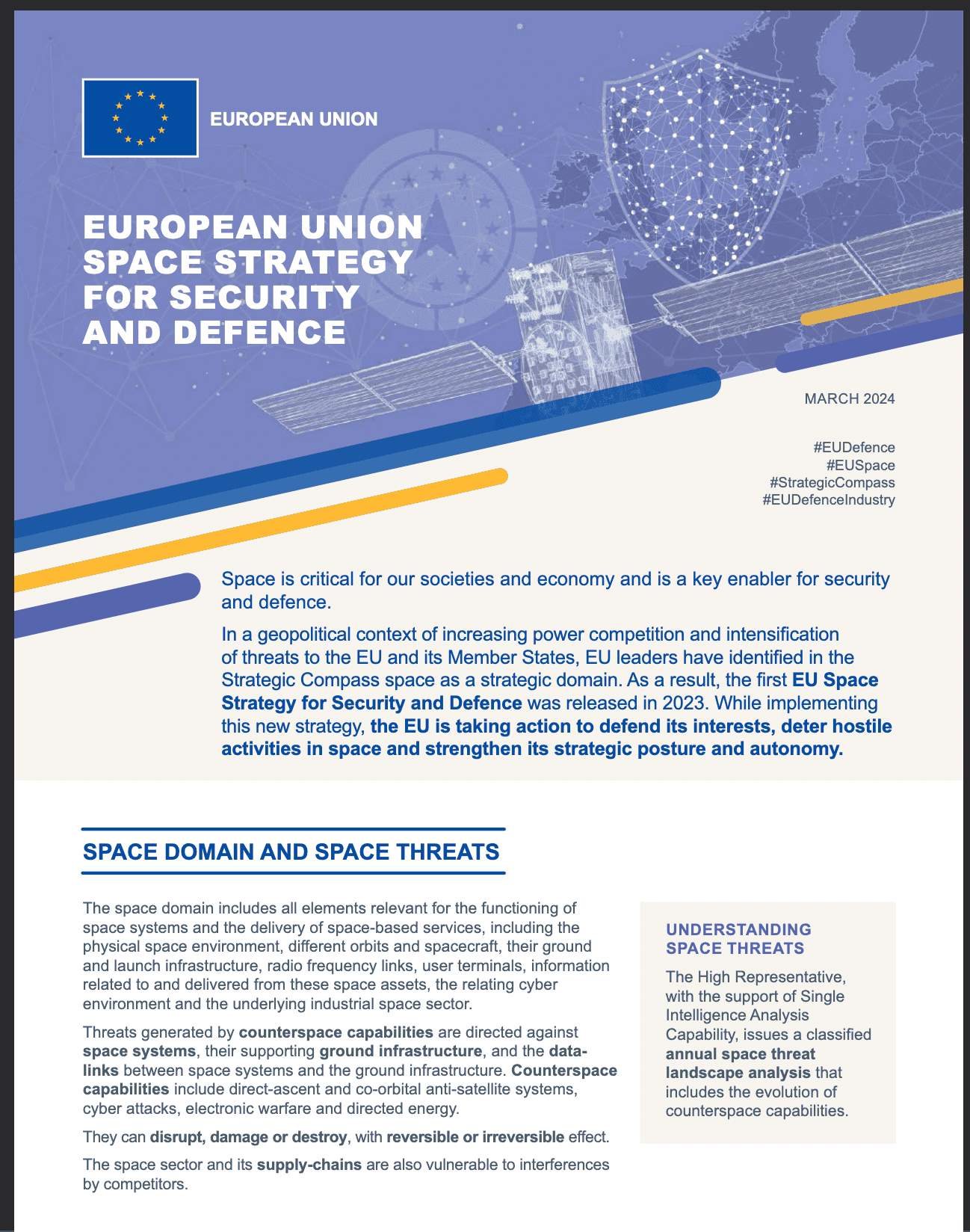EU Space Programme
In 2021, the EU Space Programme was implemented, establishing the European Union Agency for the Space Programme (EUSPA) in Prague, replacing and expanding the former European Agency for Global Navigation Satellite Systems (GSA). The new programme expands the role of EUSPA, adding two new components – management of the exploitation of Galileo and EGNOS. Most importantly, EUSPA became responsible for the security accreditation of all the components of the EU Space Programme.4
The five main components of the EU Space Programme5 are:
- Galileo: Navigation (GNSS)
- EGNOS: Navigation (GNSS)
- Copernicus: Remote sensing (Earth observation)
- GOVSATCOM: Secure communication
- SSA: Space Situational Awareness
Conclusion
The European Union (EU) has actively pursued initiatives to address space security challenges and governance. Despite some setbacks in gaining broad support for specific proposals such as the International Code of Conduct for Outer Space Activities, the EU remains committed to ensuring the safety, security and sustainability of space activities. Through efforts such as the ‘Safety, Security and Sustainability of Outer Space’ (3SOS) initiative and the EU Space Strategy for Security and Defence (EU SSSD), the EU aims to enhance shared understanding of space threats, fortify the resilience of space systems, develop collective response capabilities and foster global partnerships. Engaging in dialogue with entities such as the United States and NATO, the EU emphasises collaborative efforts to address space security. The establishment of the European Union Agency for the Space Programme (EUSPA) under the EU Space Programme points to an expansion of the EU’s role in navigation, remote sensing, secure communication and Space Situational Awareness.
Quiz
Sources for this chapter
EU. 2021. Regulation (EU) 2021/696. Official Journal of the European Union [online], available at: https://eur-lex.europa.eu/eli/reg/2021/696/oj.
European Commission. 2023. “EU Space Strategy for Security and Defence”. European Union, available at: https://defence-industry-space.ec.europa.eu/eu-space-policy/eu-space-strategy-security-and-defence_en.
European Council. 2023. “EU cooperation on security and defence”. European Union, available at: https://www.consilium.europa.eu/en/policies/defence-security/#space.
Kaatz-Drzeżdżon, Ewelina. 2021. “New EU Space Regulation comes into force”. Entrusted [online], available at: https://entrusted.eu/news-events/news/space-programme-2021-2027-gives-new-prospects-2
“NATO’s Approach to Space”. NATO, 2023, available at: https://www.nato.int/cps/en/natohq/topics_175419.htm.
Footnotes
-
European Council. 2023. “EU cooperation on security and defence”. European Union, available at:https://www.consilium.europa.eu/en/policies/defence-security/#space. ↩
-
European Commission. 2023. “EU Space Strategy for Security and Defence”. European Union, available at: https://defence-industry-space.ec.europa.eu/eu-space-policy/eu-space-strategy-security-and-defence_en. ↩
-
“NATO’s Approach to Space”. NATO, 2023, available at: https://www.nato.int/cps/en/natohq/topics_175419.htm. ↩
-
Kaatz-Drzeżdżon, Ewelina. 2021. “New EU Space Regulation comes into force”. Entrusted [online], available at: https://entrusted.eu/news-events/news/space-programme-2021-2027-gives-new-prospects-2. ↩
-
EU. 2021. Regulation (EU) 2021/696. Official Journal of the European Union [online], available at: https://eur-lex.europa.eu/eli/reg/2021/696/oj ↩
